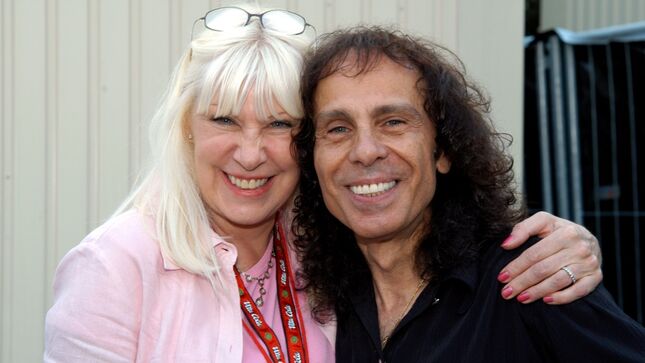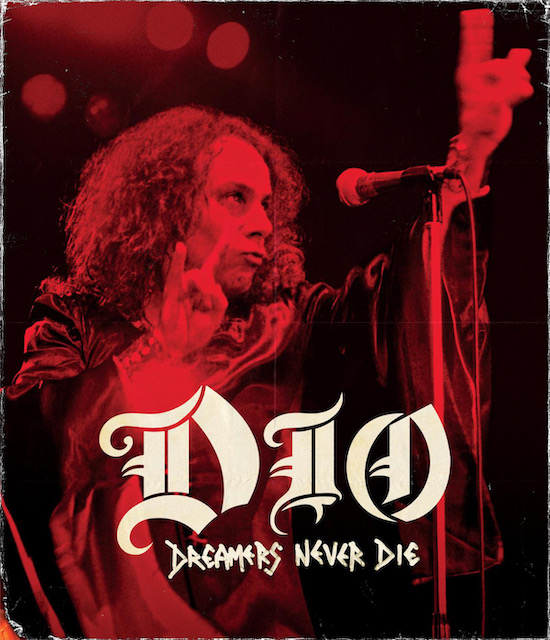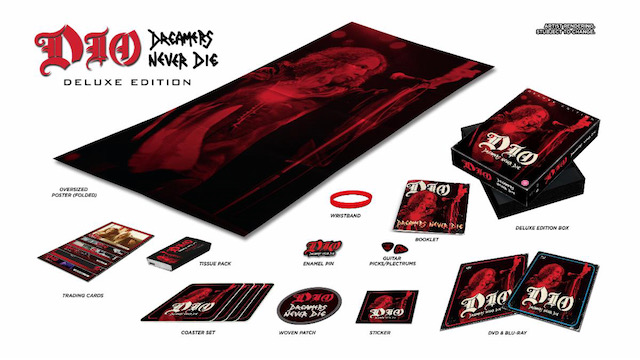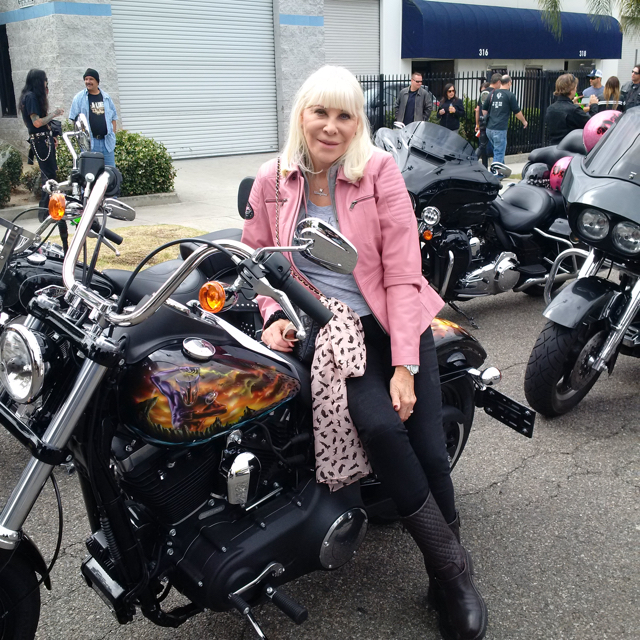
It’s hard to hold back the tears when you watch Wendy Dio carry a bouquet of flowers to the mausoleum that houses the remains of music icon Ronnie James Dio at the end of the career-spanning documentary, Dio: Dreamers Never Die, out now via Mercury Studios on DVD and Blu-Ray+4K and as a special Deluxe Edition featuring the DVD and Blu-Ray packaged with exclusive merchandise.
“Absolutely, yeah. It was a bittersweet journey,” Wendy Dio says about the film on BraveWords' Streaming For Vengeance. “It took a long time, especially with COVID in the middle of it, but I think Don (Argot) and Demian (Fenton) the directors did a fantastic job. You know, we just all worked really really hard on it, and I think Ronnie would be really happy."

BraveWords: There's just so much love in this movie, it's just oozing, from start to finish. When was the actual seed planted to get this thing in motion?
Dio: "Well, for many years directors have been asking me about doing a Dio documentary, and it never was the right time or the right people. And then BMG asked me about doing it, and they financed it, and I interviewed a lot of different directors. And then Don and Demian were big fans of Ronnie's, they knew a lot of things that I even didn't know, and I was like, 'Oh, wow, these guys are cool', and so we started the process. And the more and more I got to know, and the more and more I trusted them, and the more and more stuff I gave them to go with."
BraveWords: You know what I find remarkable, is that literally everyone on the planet has this thing called a smart phone, and is doing video constantly. It's an incredible addiction, but I find it so heartwarming to see that there was actually video from the past, way before the smart phone. So how much of his life, during his life, were you thinking about video? And how did you do it? (Mimicking old-time movie camera, cranked by hand).
Dio: (laughs) "Well, you know, we took video and some of this stuff is really just, yeah exactly, the old things where you used to put the slides in. We even used some of that stuff, but I think we started doing a lot of real video stuff when MTV came in, that's when I think everybody really started doing videos and making videos and doing stuff."
BraveWords: Very funny indeed. Well, and there's a lot of people that are actually very thankful that there wasn't phones back then, in the hey day of things in the ‘70s and ‘60s!
Dio: (laughs). "When we made this documentary, we really wanted to find things that even the biggest fans didn't know about Ronnie, you know? I hope we pulled out a few jewels there."
BraveWords: Was there footage that actually surprised you?
Dio: "Yes, because I gave the guys a whole bunch of stuff and I certainly didn't expect to be seeing me on the beach. That was like, 'Whoa! Where did that come from?'."
BraveWords: So, tell me about working with these producers then, and really how big of fans were they, and had they met Ronnie before?
Dio: "No, they had not met Ronnie, unfortunately, but they had been fans of Ronnie's. They're from Philadelphia, so they were used to, you know when Ronnie did the NFL 17 camera shoot for the Spectrum they were interested in that, they knew all about that, they knew all about Ronnie and lots of different things about Ronnie, they had followed his career and were big fans of his. So, it was very easy to work with them. They were really easy people to work with, and I think they did an excellent job with what we gave them. I think the storyline was just great, what they did with it."
BraveWords: The packaging is like a treasure trove for fans. Tell me about that whole process. Because I look at this, and like, everyone is doing box sets these days, but I look at all the effort and the energy and just to make something cool for the fans.
Dio: "That's what we wanted to do, give a little bit extra in there. There's a lot of bonus material in there that people didn't see. When the film came out, came into theatres all over the world for a few days, then here it's on Showtime, you can see it here, but in Europe and everywhere, nobody could see it because it's not available anywhere. So, I'm really happy about the documentary coming out on Blu Ray and DVD, and also we wanted to give a little bit something extra in the packaging. So, there is a deluxe version with all the things in there, there's all kinds of stuff, there's guitar picks, and patches, and coasters and all kinds of little things in there. Just little extras that we wanted to throw in."

BraveWords: You know what's really special about this film, is all the guest appearances. You can tell just how much love they had for Ronnie. Every single one of those interviews. People like Sebastian Bach and Lita Ford for example was so excited to talk about him.
Dio: “I only wanted to include people that were really close to Ronnie. And I think that they were all so amazing. Everybody gave it their heart and everything, because Ronnie was a special person. He was a very special person. You know, he's a big star up on stage, but you know otherwise he was just a homebody. He never forgot where he came from, and his friends. He loved people and he loved to listen to what they had to say. He would ask people lots of things. He could talk to someone from 8 to 80 and have something say and to find out about them."
BraveWords: He was really cool and confident, and he was taller than a giant, just the way he acted.
Dio: "That's why I like that video of ‘Rainbow In The Dark’, on top of the roof, he was like, 'Ooh, I look tall in that!'".
BraveWords: I don't mean to be disrespectful at all, but it came up a couple of times, I tell you these days if you use the term "midget" you would just be lambasted.
Dio: "Yep, yep, absolutely."
BraveWords: And honestly, I don't even think of height, or whatever, as I said, he walked taller than giants.
Dio: "Well that's what Ronnie's songs are all about, actually. He was all about the underdog. The person that was maybe too tall, too short, too fat, too whatever. He was always for the underdog that was maybe just outcast by their friends and stuff, and they needed to listen to somebody that was telling them it's okay, let's go on, don't give up, don't listen to these idiots who are telling you you can't do it, because you can do it. And that's what Ronnie's whole life was about, making sure that people would believe in themselves."
BraveWords: Right. And at the end of the day, it was all about the fans and the kids, and I find it strange that you guys never had kids because I guess the whole world was your kid. Because I don't have kids either, and people ask me all the time, and I'm like, "My website is my kid".
Dio: "Our kids have tails. We had many kids with tails. We always had dogs and cats and everything, and those were always rescue guys that nobody wanted."
BraveWords: Let me ask you about some of the footage. Especially the Elf footage, and I don't think a lot of people understand actually how heavy that band was.
Dio: "It was a great band, actually. It would have been - I think it could have been a successful band if Ronnie hadn't joined Rainbow. It was a great band, it was a honky tonk band and it was a fun band that everybody loved to listen to and have a good time with."
BraveWords: But what was going through his head, because way prior to that he was doing a lot of contemporary, beautiful singing, and it wasn't heavy. What went through his head to make it heavy? And obviously it got heavier with Rainbow and his solo material, and Sabbath and everything. Why do you think it had to get heavier? And what inspired that?
Dio: "I think that he wanted to do what he wanted to do, you know? He did the cover tunes for so many years, and then he just wanted to do his own thing, and make his own music, and I think that's what he did. He just wanted to do his own thing. And he was very much of a control person, who wanted to be in control of his life, and do what he wanted to do, himself. I mean he played trumpet for years and years and years, and his father had forced him into playing, into learning the trumpet. He played it for years and then he found he couldn't pick up girls with trumpet, so he taught himself bass, so then he became the bass player in Elf because he could pick up girls with bass, not with trumpet."
BraveWords: You even say that he never played it for you.
Dio: "No. I have the trumpet."
BraveWords: Yes, I know.
Dio: "He wouldn't. He had given it up for good, and that was it."

BraveWords: Now, let me ask you a private question. When you awoke to a brand new day with Ronnie James Dio in your world, how did he greet you? What memories do you miss from waking up and it was like, "I'm with this rock star"?
Dio: "Well, at home he wasn't a rock star. He was Ronnie, and that was it, and sometimes Ronald if I was mad with him. No, we just liked to hang around at home with the animals, have friends over, we have a lovely bar here which I'm actually sitting at right now, we brought it in from England. It's from the 1800s and we brought it over from England and put it in the house. And that's it, he just liked to hang at home with a few of his friends, close friends, watch sports - he loved to watch sports and he'd write songs, he'd have his guitar on the couch and write songs watching football."
BraveWords: What attracted you from the beginning when you first met him?
Dio: "When I first met him, he was following me around and I was like 'No, he's too short for me.' Then we talked and talked and talked. We were up at a party at Ritchie Blackmore's house. When I met Ronnie, they had just finished Blackmore's Rainbow. Recording it, they hadn't toured yet. So there was a party up in the Hollywood Hills, and they invited me. So I went up there and Ronnie was following me around and I was still like 'No, too short for me. Then we talked and talked then everyone went down to Dennys for breakfast and sunrise was coming up. So I said 'Do you want to go for a ride,' so we drove up to Malibu and it was really nice, and we kept talking. But I feel in love with his brain. We didn't think it was going to last, we just figured we'll have fun for a couple of weeks which we did and then he went on tour. And I thought that was the end of that. Then he called me and said 'Why don't you quit your job and join me and I said 'I can't quit my job, I'll come for a couple of weeks and it ended being for the rest of my life."
BraveWords: Didn't anybody in your circle warn you from falling in love with a musician?
Dio: "I've always done with whatever I wanted to, myself. I'm a control freak, just like Ronnie was. We butted heads a lot of times."
BraveWords: Now, what would Ronnie say about this whole vinyl craze that we're all going through?
Dio: "He would be so excited. Ronnie was so upset when cassettes came in. He'd say "You buy the album so you can look at the album cover, because there was always such great artwork, which you couldn't really see on a tiny cassette. Same with CDs. He loved seeing an album with great artwork. He would've been ecstatic if he knew that vinyl had come back now."
BraveWords: There is a point in the film that focused on the way grunge truly crushed the business. I'm actually reading Dave Grohl's absolutely excellent biography. But Nirvana really took a toll on a lot of bands. How did Ronnie overcome that? Was he a fan of the grunge music?
Dio: "Grunge came in and metal was out. Ronnie lost his deal with Warner Brothers. Van Halen lost their deal with Warner Brothers. A lot of people lost their deals. I think that the saddest time in Ronnie's life. By not having a record deal, it was so important to them. It was really a sad time. But I went out, I went to Europe, to Germany, to England, everything, to find a record deal, and I did find one. Then I did find out that the independents are better than a Warner Brothers or a Sony because they owned you for the rest of your life. Whereas with an independent, they license it to you for five for seven years and you get it back again. And they work really, really hard. And then I think it came back full circle, because we are back with Warner Brothers again, because they've realized I think, and they are doing a really good job. I have four albums with BMG and six with Warner, but they're licensed now. They don't own them forever. BMG has all the vinyls coming out, I think they came out on the 22nd of September, a whole big boxed set of the last four records Ronnie made on vinyl."
BraveWords: Now, how much of a hand do you have in designing, and input? Obviously you have the signing off privileges, like the last sign off for all this stuff.
Dio: "Oh no, I've always had a lot of control in that. Warner Brothers and BMG, they're amazing to work with. They're great people and I get control with them all the time. The only person that doesn't give us any control of course is, when we sign the deal, Warner Brothers, Rhino has the U.S. and Canada, but Universal has the rest of the world. Polygram, Sanctuary, and Universal, they just put things out. Sometimes I have to look on the internet to know that they're out."
BraveWords: Wow. Does that frustrate you though?
Dio: "Very frustrating. I think it's very rude, too, not to consult with the artist or the artist's management."
BraveWords: I agree. Ronnie ended up working with some of the greatest guitarists in rock history. Is there any guitarist that he wanted to work with, but that opportunity never materialized?
Dio: "He worked with John Sykes for a while. But it didn't work out with him and the band, but it was great working with him. I don't think he could've chosen anyone better than Tony Iommi. As Ronnie put him, 'The riff master'. That was his most enjoyable part of his career, working with Sabbath, because they were all such amazing players. He really enjoyed working with Geezer and Vinny. He said that you had to keep up with them because they were all great players. And that was the thing that I was really happy for, it came back full circle and he got to play with the Sabbath guys again before he passed away, in Heaven & Hell."
BraveWords: Ritchie Blackmore is sadly absent from this documentary. Did you ask him?
Dio: "Of course. But he always says no. 'No, no, no.' In fact we were told we couldn't use a lot of the Rainbow stuff, that's why it's not in the film. He didn't want it."
BraveWords: Wow. Why do you think that is?
Dio: "No idea. Ritchie is Ritchie. He has his own views, he does what he does. He's a great player, amazing player, but he's a bit difficult in other places."
BraveWords: Yeah, I understand. When I was reading Geezer Butler's biography, he claims he invented these (making metal horns sign with hand).
Dio: "A lot of people say they invented those. I think Gene Simmons said he invented it. Nobody invented it. It's an old malocchio sign that dates back thousands of years, it's an Italian sign. I don't think that Geezer Butler or Gene Simmons are Italian. It's an old malocchio sign to ward off evil or to give evil, and Ronnie used to see his grandma - his grandfather worked in the steel mill, and when he was six years old he used to walk with his grandma to give his grandpa his lunch, and he would see her give that sign to people to either ward off evil or give the evil eye. So, you know a lot of people say they invented it, but no one invented it. It's an old, old thing. Whether they used it before Ronnie, I don't know, maybe they did, who knows? But it was just something that Ronnie grew up with, and when he was in Sabbath Ozzy always did the peace sign, and he wanted to do something different. So he just threw the horns and it just caught on everywhere."
BraveWords: Did you guys actually discuss that being part of the act, and then looking at the audience and seeing everyone doing it back at you?
Dio: "I think that was something Ronnie loved. He didn't intend to do it, but he loved when they did it, it was like they were in the same club. It was kind of like a cult thing, it was like, these fans are giving me the sign, I'm giving them the sign, and we're all one."
BraveWords: I had the opportunity to see the Heaven & Hell show at Wacken, with one hundred thousand people. Songs like ‘Children Of The Sea’. I'm sure you must have been at the show, were you with him?
Dio: "Yes of course."
BraveWords: What are your memories? Because that was one of the most incredible moments in metal history, just standing in that audience. And the band, they were just like shitting themselves, they were so happy.
Dio: "Oh absolutely, absolutely. It was always fun. You know, German audiences are always a fantastic audience, Wacken is always a great place to go, and everyone gets value for their money because you get so many bands on there. But you know, also in the States when they played the Colosseum, that was like a sea of people. I've never seen so many people in my life. Ronnie didn't care if he played for ten people or ten million people, he would always give his all no matter what. In fact, when we had the grunge come in and it was the 90s and he lost his record deal, he was still playing. Playing in small places, which you know, it was a bit humbling for him, but his fans were there and he gave them the same as he would in a big auditorium."
BraveWords: And whenever I met him there was no ego. Tell me how he was the ringleader with the charity album Stars, around all those egos?
Dio: "There were no egos, that was a fun time. That was really fun, everyone was doing something. Because you know, We Are The World, they did that, and they didn't want any of us nasty heavy metal people, so they did their own one. And everyone was like, asking to be in there. Ronnie asked a few people, but the rest of them would just call up saying, 'Can we ,be involved?'. It was a really fun time. Everybody gave their all, and everybody was doing such a great job, and we raised a lot of money for Africa."
BraveWords: The term Hear ’N Aid is absolute genius. Who thought of that, was it you or Ronnie?
Dio: "I can't remember who thought of that. It might have been our publicist, Sharon Weisz, I'm not sure. I mean. Don't remember, but it was great. It wasn't me, I don't know who came up with it. Hear ’N Aid."
BraveWords: Give me an update on your charity, please.
Dio: "Oh yes, okay. A new thing we've got is, well not a new thing, but what's coming up is we've got bowling again, Bowl For Ronnie, on the 16th of November, at Pinz in Studio City. We've got celebrities, Eddie Trunk is always there for us, and we've got the celebrity lane - we're not sure who's on it yet. Jack Black's usually there when he's not somewhere filming. We get Tom Morello, Dave Grohl, you know, whoever is in town at the time. It's a fun thing for whoever wants to come. And we have a bowling celebrity lane, and then we have an auction for someone to be able to be on that lane, on Eddie's celebrity lane. It's a really fun evening, and we're almost sold out. It's a really fun evening making money for our charity. Last year I think we made $72,000 towards research. And we're working with Dr. Wong from UCLA who's coming up with a saliva test for gastric cancers, stomach cancers, and pancreatic cancer. That's really good because women are really good about going and getting checked, but men you've got to drag them there, because they don't like the finger up the bum, so this will be a non-invasive test, just a swab in your mouth for early detection. Because early detection saves lives."
BraveWords: That's wonderful news. And, in terms of the catalogue, is it like a sea of things that could be released when you go into that?
Dio: "Yes. Well, you know, as I said, BMG is bringing out the four albums on vinyl. Last year we did Holy Diver and we did a remix with Joe Barresi which was really cool, it brought it all up to date. I was very pleased with that. And a boxed set. And I know next year Rhino's working on Last In Line, with a remix, I'm not sure who's going to be the producer who will remix it, but we're working on that. There's a lot of stuff we found in the vault and we're working with Wyn Davis, Ronnie's engineer, categorizing everything that's in the vault. We do have at least one unreleased song that we found with Doug Aldrich and there's some other stuff that I'm putting together. I want to put this other album together, with some interesting stuff. So, we're working on that. Of course next year we'll have our charity Rock For Ronnie that will run in May. My job is to keep Ronnie's memory and his music alive."
BraveWords: Well, you obviously never get over the mourning process, but was there a point where you just woke up one day and you were like, "I've got to start doing this in honour of him"?
Dio: "Well, I started saying that to myself as we were laying Ronnie to rest. I said, 'I will make sure that Ronnie's memory and music is always there, as long as I live', and my daughter will carry that on."
(Top photo credit: Håkon Grav)
Wendy Dio on BraveWords' Streaming For Vengeance: